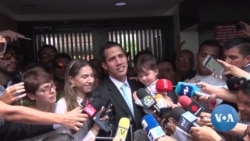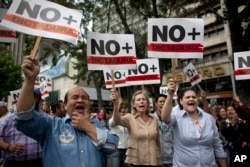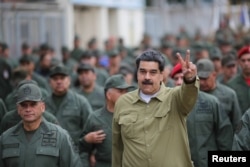Venezuelan opposition leader Juan Guaido says security forces showed up at his wife's Caracas apartment Thursday in an effort to intimidate him.
Guaido said the agents from a feared police unit arrived at the unit Thursday, asking for his wife, Fabiana. In a tweet, Guaido said the incident happened while his 20-month-old daughter and her grandmother were home and that if anything happened to the child, he would hold socialist leader Nicolas Maduro responsible. There was no immediate response from the Maduro government.
In comments to reporters, Guaido thanked neighbors who rushed to the apartment, banging pots and pans after the police showed up. Guaido, whom the U.S. and other countries recognized as Venezuela's interim president, said the neighbors denounced and vocalized what was happening at that moment and came to protect and watch over his wife and daughter while the agents searched for information.
WATCH: Venezuela's Guaido Accuses Maduro of Intimidating His Family
Reports say the agents later left the building.
U.S. Senator Marco Rubio also tweeted about the incident and described the security forces as "Maduro shock troops." Rubio said the incident was clearly an effort to intimidate Guaido and the opposition.
Guaido, the president of the opposition-controlled National Assembly, declared himself interim president last week after the Assembly declared that Maduro's re-election last May was illegitimate, as most opposition candidates either boycotted the race or were prevented from running. The United States has recognized Guaido as interim leader.
In a Jan. 30 opinion piece for The New York Times, Guaido said more than 50 countries have either recognized him as interim president or the National Assembly as the legitimate authority in Venezuela, and has appealed to U.N. Secretary-General Antonio Guterres for humanitarian assistance. Guaido says he has begun the process of appointing ambassadors and "locating and recovering national assets tied up abroad."
Guaido claims he has held "clandestine meetings" with members of the military to convince them to withdraw their support for Maduro, which he says is "crucial to enabling a change in government."
Venezuelans took to the streets of Caracas Wednesday in response to Guaido's call for a peaceful, two-hour, midday protest "to demand that the armed forces side with the people." He is offering amnesty to soldiers who back his movement and reject Maduro's socialist government.
"Mr. Maduro no longer has the support of the people," Guaido wrote.
During an interview with Russia's RIA news agency Wednesday, President Maduro said he is ready to hold talks with the country's opposition forces and hold early legislative elections; but, he rejected Guaido's demands to hold a new presidential election before 2025.
The White House says President Donald Trump expressed his "strong support" for efforts to restore democracy in Venezuela during a conversation Wednesday with Guaido.
White House press secretary Sarah Sanders said Trump and Guaido also committed to maintaining "regular communication to support Venezuela's path back to stability, and to rebuild the bilateral relationship" between the two countries.
Trump issued a tweet earlier Wednesday acknowledging Maduro's offer to negotiate with Guaido, but warned Americans not to travel to Venezuela "until further notice."
Five foreign journalists have been detained by Venezuelan authorities covering the deteriorating political situation. A Spanish reporter and a Colombian television producer working for the Spanish news agency EFE were detained Wednesday, a day after the arrest of two French television journalists in Caracas. Two Chilean television journalists were detained for several hours Tuesday before they were expelled from the country.
The collapse of world energy prices, corruption and failed socialist policies have created an economic and humanitarian crisis in oil-rich Venezuela.
Food, fuel and medicine are in extremely short supply. Inflation is out of control. Millions of Venezuelans have fled the country, and Maduro has shown little tolerance for opposition-led protests.
Maduro has blamed his country's woes on the United States, which he accuses of working with the opposition to topple the government. He has called world leaders who want him gone "Trump sycophants."
The Trump administration has imposed sanctions on PDVSA, Venezuela's government-owned oil company. The sanctions announced Monday will freeze any assets the state-owned PDVSA has in the United States, and bars U.S. firms and citizens from doing business with it.
PDVSA's U.S.-based subsidiary, Citgo, which refines Venezuelan oil and sells Citgo brand gasoline in the U.S., will continue to operate as usual. But any money Citgo earns will be placed in a blocked account.
Maduro said the United States is trying to "steal" Citgo from Venezuela.
U.S. Treasury Secretary Steven Mnuchin said Venezuela can get relief from the sanctions when control of the oil company is turned over to Guaido.
Alvaro Algarra, VOA Spanish Service's reporter in Caracas, contributed to this story.









